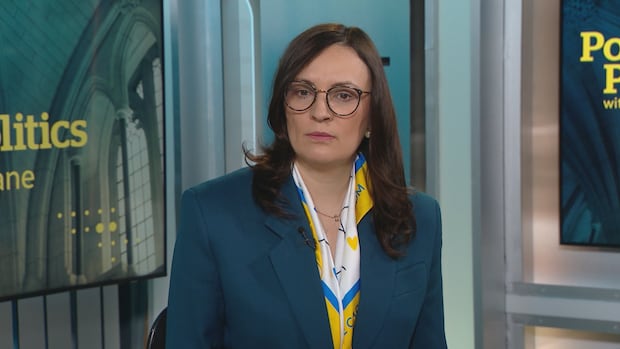Ukraine is facing hard choices as it decides who to call up to the fight against an all-out Russian invasion that has lasted more than two years.
Men as young as 25 can now be drafted, down from age 27 previously. This week, the government said military-age Ukrainian men — with limited exceptions — cannot have their passports renewed outside Ukraine and consular services won’t be available to them in the weeks ahead.
“Staying abroad does not relieve a citizen of his or her duties to the homeland,” said Ukrainian Foreign Minister Dmytro Kuleba, underlining Kyiv’s position on citizens’ obligations to their country.
Ukraine is already estimated to have roughly one million people in uniform. But after such prolonged fighting with Russia, there is need to find fresh recruits to ensure Kyiv does not lose the ongoing battle.
“This is … a short-term need that must be fulfilled,” said Khrystyna Holynska, a California-based assistant policy researcher at the RAND Corporation think-tank.
U.S. President Joe Biden has approved a $61 billion military aid package for Ukraine. Ukrainian Ambassador to Canada Yuliya Kovaliv says this is a very important step in her country’s battle with Russia and it should be followed by other allies.
If this can’t be met, Holynska said there may be no point in discussing longer-term needs for the state.
“Ukraine’s existence as a country is at stake,” said Holynska, who holds a PhD in political science from Taras Shevchenko National University of Kyiv.
And the longer the war goes on, the more people that will be needed to carry on the fight — a reality that is playing into some tensions over those who have been able to avoid the front lines so far.
“Volunteers seem to have almost run out,” Ukrainian journalist Andriy Kulykov, the chairman of Hromadske Radio, said via email, quoting a Ukrainian soldier who recently spoke to his media organization.
Outside the war zone
Reaction to Kyiv’s consular-service pullback for military-age men outside the country has ranged from upset to shrugged shoulders.
Anatoly Nezgoduk, a 21-year-old Ukrainian studying abroad in Canada, did not see reason to criticize what Kyiv is doing.
“I understand very well that there is a war in our country, so I can’t call this move weird, illegal or incorrect,” he told Reuters. “In a way, this distances me from Ukraine’s official representation abroad.”
Kulykov, the Hromadske Radio journalist, said Ukrainians understand there are legitimate reasons why some people are exempt from mobilization — such as those looking after relatives with disabilities.
“Those who do not have a legitimate excuse are viewed by many as cowards and traitors,” Kulykov said.
“Then again, there are quite a lot of people in Ukraine who have the ‘No one wants to get killed’ attitude, and they may be envious of these men’s safety but do not condemn them.”
Viktor Kovalenko served in the Ukrainian military a decade ago and remembers what it was like to see others shirk a call to duty, while he was taking part.
“It was painful for me,” said Kovalenko, a former journalist who now lives in the United States after spending his first 45 years in Ukraine, where he was born.
Kovalenko said he saw friends and colleagues avoid military service, leaving him feeling “alone.” Some of these same peers later admitted to having ignored conscription notices sent their way, he said.
In his estimation, when a portion of society is “indifferent” to serious national threats, it’s a serious problem.
“Who will defend in a case of aggression?” Kovalenko said.
Delayed aid
Ukraine had been waiting for urgently needed military aid, which U.S. legislators finally approved this week.
As a result, the U.S. will now speed a $1-billion US military package — including ammunition for air defences, rocket systems and anti-tank weapons — to Ukraine.
The U.S. believes Ukraine can prevail over Russia, although as U.S. National Security Adviser Jake Sullivan put it, “there is no silver bullet in this conflict,” despite the provision of various weapons, including long-range missiles.
Giorgi Revishvili, an analyst and author of the Russia Analyzed newsletter, said Ukraine was left trying to cope with ammunition shortages while it waited for the U.S. aid to come through.
He said the delay had an effect on the battlefield — both directly and indirectly.
“It … affected the Ukrainians’ fighting spirit and fighting force,” said Revishvili, a Fulbright scholar at the Bush School of Government and Public Service at Texas A&M University.
“Because if you don’t have munitions, [having] only bravery and courage will not help you defend your homeland.”
The mobilization issue has not gone unnoticed in Russia, where the state news agency TASS has frequently mentioned Ukraine’s related legislation in recent days.
“Every sensitive issue regarding war in Ukraine … Russia will try to exploit,” said Revishvili.
Reading the room
Several observers saw Kyiv’s consular and passport actions as being rooted in domestic political considerations.
“My personal feeling is that the authorities are responding to the mood in the country,” said Hromadske Radio’s Kulykov.
Ukrainians are fighting an opponent with a “huge advantage in numbers” that reminds them that some people have avoided the fight by being outside the country, he said.
He’s skeptical these moves will generate many new conscripts.
“The opinion seems to prevail (and I share it) that an absolute majority of those who felt the urge (or deemed it feasible) to come back and join the fight either in the army or in supporting the economy, have done so,” said Kulykov.
Yet Holynska, the RAND Corporation expert, said the Ukrainian government may also be trying to discourage efforts to leave the country.
“I do think that part of the calculus … was to deter more people from leaving Ukraine and from avoiding the draft,” said Holynska.
Get the latest on CBCNews.ca, the CBC News App, and CBC News Network for breaking news and analysis.
This could also include discourage people aiding others in avoiding conscription by demonstrating Ukraine has legal mechanisms to address the issue, she said.
But Kyiv’s approach could also have consequences on how enthusiastic Ukrainians living abroad are about returning home.
“Actions like this … are not incentivizing them to keep ties with Ukraine,” Holynska said.


